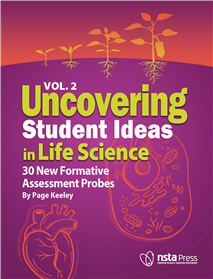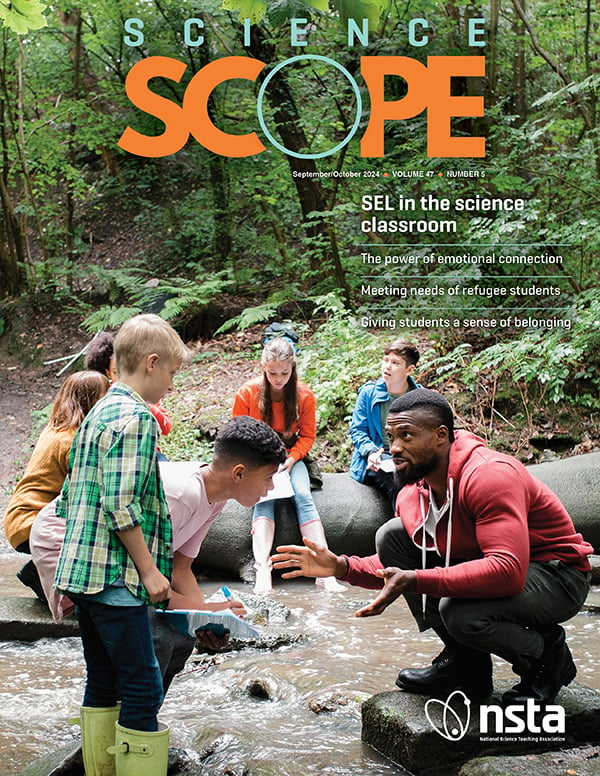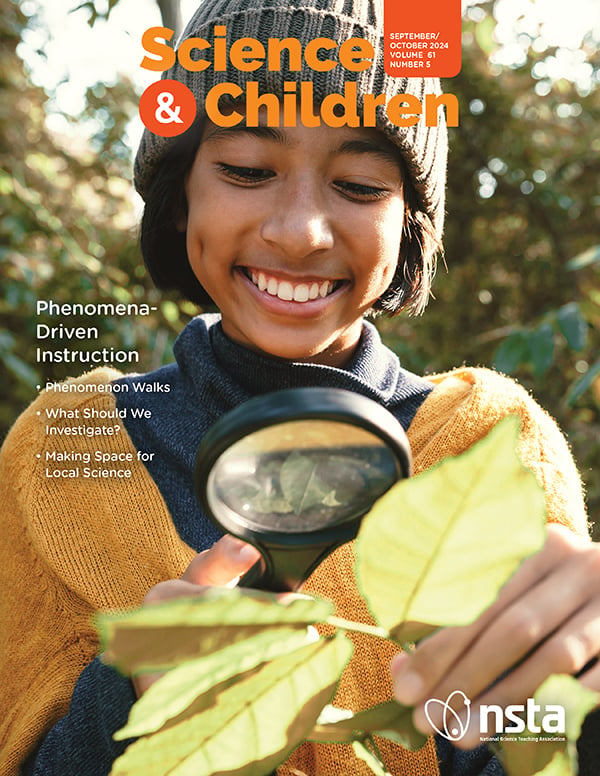All Resources
Journal Article
Q: How can I address science misconceptions using phenomena-driven instruction?
Q: How can I address science misconceptions using phenomena-driven instruction?...
By Matthew Bobrowsky
Journal Article
Integrating engineering into the science curriculum in a meaningful way requires planning that utilizes a 3-dimensional approach. Using a “gather, reason, communicate” framework (Moulding, Huff, Van der Veen, 2020) provided me with an effective ...
By Katheryn Kennedy
Journal Article
For preservice K–5 teachers, understanding how to implement phenomenon-based learning in an elementary classroom is an important skill, particularly as it relates to integrating the Next Generation Science Standards. This article presents one way t...
By Steph Dean
Journal Article
In this article, we describe how we use classroom phenomena to help fifth grade students develop testable questions and productive investigations. Engaging students in observing and seeking to explain a classroom decomposition chamber has helped them...
By Eve Manz, Annabel Stoler, Lorin Federico, Samantha Patton, Lindsay Weaver, Genelle Diaz Silveira, Souhaila Nassar
Journal Article
Phenomena Interest Comes Naturally to Young Children
A child’s world is one filled with observable daily events or facts referred to as phenomenon that exist or happen, especially those that invoke a cause or explanation in question. From the earliest ages, young children are active learners explorin...
By Shelly Counsell
Journal Article
Patterns are Everywhere: Exploring the schoolyard to facilitate thinking about science phenomena
After realizing the difficulty educators face with integrating the crosscutting concepts (CCCs) from the Next Generation Science Standards into their lessons and noticing missed opportunities for caregivers to engage children in scientific thinking, ...
By Brandon Davis, Ingrid Carter, Lisa Dispense
Journal Article
Using learning objectives to guide course design is often considered an educational best practice, but little research exists that explores how students use them over time and across courses. We surveyed students on their use and perceived value of l...
By Sarah Leupen, Tory Williams, Linda Hodges, Laura Ott, Eric Anderson, Lili Cui, Kalman Nanes, H. Perks, Cynthia Wagner
Journal Article
This study summarizes the comparison of interactive lecturing and technology-supported student-centered pedagogy across six semesters of an introductory physical geology course. A multiple linear regression analysis of 967 student scores shows that a...
By Theresa Halligan, Cinzia Cervato, Ulrike Genschel
Journal Article
The development of web-based technologies in recent decades has provided ready access to a wealth of on-line educational resources, and despite concerns that availability of on-line recorded lectures impacts on-campus attendance, we believe there nee...
By Andrew Seen, Tony Kerr, Joee Kelk, Sharon Fraser
Journal Article
Students’ academic performance improves when they use active study methods and discussion of study strategy efficacy can impact students’ choice. Faculty often employ mid-semester wrappers to encourage student reflection on their study habits, so...
By Maya Sobel, Linden Higgins
Journal Article
Students are encouraged to develop a set of scientific skills and disciplinary practices common across the STEM disciplines....
By Daniel SIlverio, Eugenia Villa-Cuesta, Alison Hyslop, Kevin Kolack, Sabrina Sobel
Journal Article
Student-centered approaches to breaking through scientific writing barriers
Scientific writing is a rewarding, challenging, and necessary part of research. Building skills in scientific writing is critical in graduate student training and provides the foundation for scientific communication at all professional levels. Despit...
By Laura Young, Blessing Okosun, Lydia Westberg, Diane Darland, Emily Gisi, Julia Hampton, He Huang, Lydia Kantonen, DEHUI KONG, Lynda LaFond, Jeremy Martin
Journal Article
Out of School Engagements in Forensic Science on a College Campus
Out of school informal learning environments provide an excellent experience for students to develop scientific curiosity and critical thinking skills. Currently, there is a range of methods available for supporting STEM learning. As schools focus on...
By Sonali Raje, Keri-Anne Croce, Noelle Neff, Shannon Stitzel, Kelly Elkins
Journal Article
Can a simple metacognitive intervention influence students’ knowledge, behavior, and performance?
Metacognition is often described as the awareness and regulation of learning. It uses strategies which include monitoring one’s own thinking, engaging in active planning and self-evaluating one’s study habits. Bloom’s taxonomy can be used as a...
By Kathleen Hefferon, Esther Angert, Anna Levina
Journal Article
Many initiatives attempt to smooth transitions between 2-year colleges and 4-year universities, but retention and graduation rates for transfer-students are still low, especially in STEM. The Transfer-student Research and Integration Program (TRIP) a...
By Ian Biazzo, Kenneth Fedorka, Kimberly Schneider, Ken Teter
Journal Article
Hybrid Group-Based Concept Mapping
Helping students to understand complex processes is one of the core challenges in teaching biology courses. Concept mapping is a flexible pedagogical method that enables students to learn the complexities of a given subject while at the same time be...
By Nathan Ruhl
Journal Article
Introducing Engineering Design to First-Year Students Through the Net Zero Energy Challenge
First-year engineering students are often introduced to the engineering design process through project-based learning situated in a concrete design context. Design contexts like mechanical engineering are commonly used, but students and teachers may ...
By Elena Sereiviene, Xiaotong Ding, Rundong Jiang, Juan Zheng, Andriy Kashyrskyy, Dylan Bulseco, Charles Xie
Journal Article
Value Creation in a Pedagogically-focused Faculty Online Learning Community
Faculty online learning communities (FOLCs) can help faculty effectively adopt and persist in using research-based curricula. This paper documents faculty perspectives on the value they gained from participating in a multi-year FOLC designed to help ...
By Fred Goldberg, Edward Price, Mo Basir, Lawrence Escalada, Steven Maier, Steven Sahyun, Tamara Snyder, Liang Zeng
Journal Article
Due to the COVID-19 pandemic, Biology Teaching Assistants (TAs) were tasked with transitioning and adapting their instruction to an online environment by quickly implementing Emergency Remote Teaching (ERT) practices. Effective online and in-person ...
By Amy Kulesza, Susan D'Agostino, Lucía Chacón-Díaz
Journal Article
Reworking the Recipe: Adding Inquiry and Reflection to College Science Labs
Cookbook-style laboratories (labs), where students follow recipes and confirm known results are common, yet years of science teaching and learning research indicate they do not help college students develop the habits of mind and skills of a scientis...
By Cari Din, Martin MacInnis
Journal Article
As the advantages of course-based undergraduate research experiences (CUREs) become widely accepted as a mainstream high-impact practice for undergraduate STEM education, it is paramount for instructors to be trained in effective practices for CURE d...
By Elizabeth Sandquist, Brett Schofield, Kristian Taylor, Alex Engel, Jinjie Liu, Aaron Putzke, Laxmi Sagwan-Barkdoll, Susan Walsh, Taylor Buchanan, Lance Barton, Karen Resendes, Michael Wolyniak
Journal Article
Who Speaks for Earth? Impacts of an Anti-Racist and Gender-Inclusive Training in an Astronomy Class
As science educators, we have an important opportunity to influence perceptions of who does science, and we can work to empower students to make our disciplines more accessible to people of all backgrounds. This goal was explicitly built into an intr...
By Kathryn Williamson, Ellen Belchior Rodrigues, Myya Helm, Christopher Cunningham, Daniel Gallegos, Unique Beaver, Iahnna Henry
Journal Article
Meeting the Needs of the Refugee Students in Your Science Classroom
Your new student roster includes refugee students. You want to communicate with them and make them feel welcome in their new science classroom; however, given their limited English and traumatic experiences that are unlike anything you have known, yo...
By Gayle Buck, Arya Karumanthra, Shukufe Rahman
Journal Article
Social-Emotional Learning in the Science Classroom
From the Editor's Desk...
By Patty McGinnis
Journal Article
Integrating Careers Into Your NGSS Lessons
Middle school is a critical time when students form ideas and preferences regarding careers they might pursue. Employers sometimes have difficulties filling STEM job openings, yet students often are not even aware these jobs exist. The middle-school ...
By Kyle Gray, Jill Maroo, Alan Czarnetzki, Sadik Kucuksari
Journal Article
Scope on the Skies regular column. An SEL-based look at comets, their impact on society, and how they are named....
By Bob Riddle
Journal Article
Expanding Language Use: Supporting Emergent Multilingual Learners’ Sensemaking in Science
Students bring with them rich cultural and linguistic ways of knowing and communicating when engaged in figuring out explanations of phenomena. However, it is a challenge for teachers to support bi/multilingual learners in language-intensive science ...
By Samuel Lee, Benjamin DiFrancesco, Caitlin Fine, Katherine McNeill
Journal Article
Fieldwork Fridays: Connecting Scientific Learning to Nature
Building routines around place-based learning allows students to apply their scientific learning to nature and form a connection with their local environment and the species in it over the course of a school year. Each Friday, in what are referred to...
By Katie Coppens
Journal Article
Snapshot Safari: Elephant Edition
Citizen Science article for the September/ October 2024 issue of Science Scope...
By Jill Nugent
Journal Article
Using Conferences to Give Students a Sense of Belonging
Conducting student conferences similar to those used by English Language Arts teachers to improve reading skills can give middle school science students a sense of belonging and ownership in science. Once a set of conference goals is determined, a te...
By Tasha Kirby
Journal Article
In the face of the escalating climate crisis, effective climate education is imperative, not only for imparting knowledge, but also for inspiring action. This paper explores innovative strategies for teaching climate change in middle school, recogniz...
By Emily Godin, Jo'el Johanson
Journal Article
Dyeing to Last: Using Natural Dyes to Create an Ideal Fabric
In this project-based lesson, students explore how chemistry concepts relate to creative expression by investigating a variety of dyeing conditions. Through sequenced discussions and investigations, students arrive at a dyed cotton product that optim...
By Tyler St. Clair, Makayla Kraetsch, Mia Arrieta
Web Seminar
Archive: Strategies on Applying for a Science Teaching Position, November 21, 2024
Preservice educators and those wanting to transition into education from a different career have tools and experiences that are directly applicable to the classroom. This session will discuss strategies to turn those experiences into a powerful...
NSTA Press Book
Uncovering Student Ideas in Life Science, Volume 2: 30 New Formative Assessment Probes
Click here to view video of Uncovering Student Ideas in Life Science, Volume 2...
By Page Keeley






